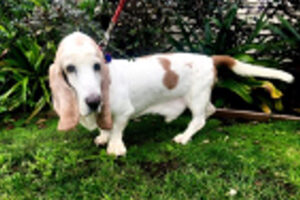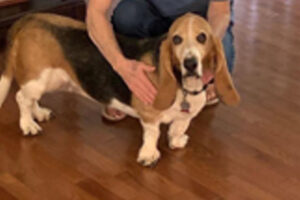Rescue
While BHCA does not engage in basset rescue activities, there are basset hound rescue groups around the country working to find homes for homeless bassets. The groups whose links can be found on this website are supportive of our efforts to promote ethical practices in basset hound rescue.
Rescue groups want to make placements that will last. They work hard to find a good fit between the dog and the home it goes to. They ask applicants to fill out a detailed application that typically asks questions about the potential home, such as the number of children and their ages, the presence of other animals, whether there is a fenced yard, your experience with bassets and other dogs, whether the dog will be alone in the home and for how long, what you are hoping to find in a pet. This information is helpful in determining what age and energy level will be the best fit, and whether you might be prepared to work with a dog that has some behavioral problems or need a dog that is well-behaved.
Occasionally rescue groups have puppies to place, but most often the dogs available through rescue are adults.
The rescue group will tell you about any known medical problems so you can make an informed adoption decision. However, rescue groups cannot guarantee the dog’s future health. Dogs available through rescue groups should have had:
- a recent veterinary check
- treatment for medical problems
- up-to-date vaccinations
- and will be spayed or neutered.
If, after you adopt, you need advice or help with the dog, by all means contact the rescue group. If they can’t help you, they should refer you to someone who can.
If, for some reason, you have to relinquish a rescue dog, contact the rescue first.
Rescue groups are run by volunteers. The costs of health checks, veterinary care, vaccinations, and spay/neuter are considerable. Rescue groups charge an adoption fee that covers only part of these expenses. Any donation you are able to make when you adopt or relinquish a dog will help other dogs find new homes.
In addition to financial support for veterinary care, rescue organizations often need help covering legal start-up costs, equipment, kennels, and public education. Donations to the BHCAF help to assure that all aspects of Rescue work move forward smoothly and that geriatric Basset Hounds and special needs Bassets are not put down just because it may take longer to find them permanent homes. Gifts also help rescue groups deal with young dogs that need discipline and training before they can be successfully placed with a new family.
For rescue groups, the Foundation has provided grants totaling over $50,000 since our inception. Here are two stories from rescue organizations about the impact of your donations:

Albert
"Albert is a 10-year-old basset hound that came to the Basset Hound Rescue of Southern California (BHRSC) last year from a shelter with many untreated issues….He became a member of the Forever Foster program, which funds the medical costs associated with taking care of an older or higher needs Basset Hound in return for the foster family providing a safe and loving home for them to live out their days…He has a big heart and a mellow disposition, and is enjoying living his peaceful life in his Forever Foster home free of pain and full of love. BHRSC is grateful for the resources provided by the Basset Hound Club of America Foundation that allow us to continue helping Basset Hounds like Albert to have the best possible outcome."

Mollie
"Nine-year old Mollie was just surrendered to us (Belly Rubs Basset Hound Rescue of Tennessee) by an owner who could no longer care for her. She had not really seen a vet in five years, so she needed a full check-up, and a badly needed dental and, at the same time, [needed to] have some suspicious lumps removed. Mollie acts more like a five year old Basset, very active and playful and already has an adopter. Her surgery is over and she is doing great. This grant helped us get her in the best shape for adoption."
